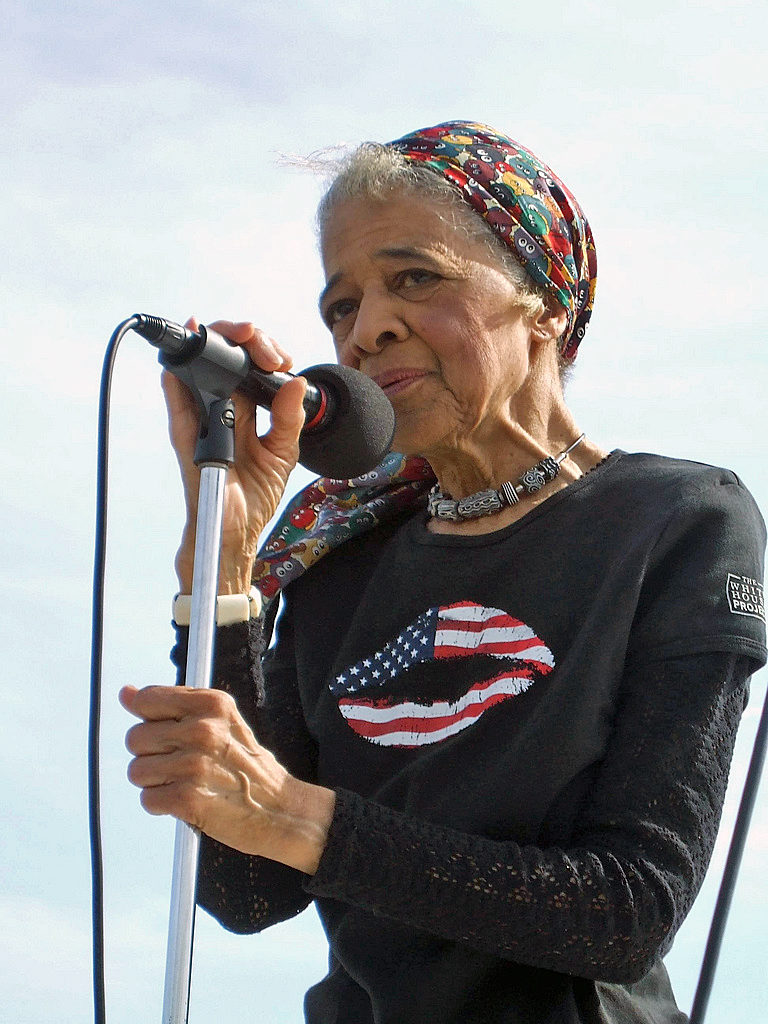Remembering Vel Phillips: A Woman of Many Firsts
- Share
- Tweet
- Pin
- Share

Vel Phillips at an event in Milwaukee in 2007. Photo by Voces de la Frontera.
On April 17, Vel Phillips, a woman of many firsts, a tiny woman with big ideas, died in Milwaukee at the age of 94.
Born Feb. 18, 1924, Velvalea Hortense Rodgers grew up with two sisters on Milwaukee’s south side. Her father, Russell, managed a restaurant and a car garage. She credited her mother, Thelma, with the idea of dreaming big dreams, including Vel’s dream of becoming a lawyer. While in high school, Vel won a national speaking contest that provided her with a full scholarship to a school of her choice. She chose the historic black college Howard University in Washington, D.C. In 1943, she and a friend made the mistake of going to a white church. The service stopped when they walked in, and they were ushered from the church. “I just thought, this is not as it should be. That just sort of a lit a fire,” Vel explained in the 2015 Wisconsin Public Television documentary Vel Phillips: Dream Big Dreams (wpt.pbslearningmedia.org).
She met and married World War II veteran Dale Phillips, and together they attended the University of Wisconsin Law School. Assigned to Badger Village, prefabricated trailers meant to house returning GIs, a petition was soon circulated to keep blacks out of Badger Village. The newlyweds found other housing, but Vel said the experience was “shattering” for her.
The Phillips rose above it and continued their studies to become the first African-American couple to graduate from the law school, and Vel was the first black woman to graduate from the school – just one of her many firsts.
The couple returned to Milwaukee and opened the law office of Phillips & Phillips.
When a new political ward was created in Milwaukee in 1956 – a ward with both black and white residents – Vel Phillips ran to represent the district and won, making her both the first woman and first African-American to serve on the city council in its 110-year existence. Two years later, she became the first black woman elected to the Democratic National Committee, where she helped to push the civil rights platform that President John Kennedy pursued when he was elected in 1960.
Meanwhile, Vel’s hometown of Milwaukee remained one of the most segregated cities in the nation. In 1962 she drafted a landmark fair housing ordinance that got one vote in the Milwaukee City Council – her own. She brought it back to the council every year, and each time it failed to gain any other than her own vote.
In August 1967, her constituents sought another strategy. A march was organized. It turned violent. Police used tear gas on the crowd. Mayor Henry Maier banned marches.
Vel did not participate in that first march, but when some decided to ignore the marching ban, Vel Phillips joined them. She was arrested and held in jail overnight, but returned to march again that night and for 198 consecutive nights.
“Because it was for fair housing, I thought nothing was going to stop us,” she said.
After two weeks of the nightly marches, she brought the fair housing ordinance again to the city council and again it was voted down 18 to 1, which prompted her to say at that meeting, “It’s bad enough to deal with a bigot, but when you’ve got a dumb bigot…”
There were threats against her and her family. When shots were fired at her house, she and her husband decided to send their two young boys to live for a while with their grandmother, who then lived in California.
“Just such a sad time,” Vel said.
In April 1968, a month after the nightly Milwaukee marches ended, Martin Luther King was assassinated, and shortly after President Lyndon Johnson signed the Civil Rights Act of 1968, which included the Fair Housing Act. Only then did the Milwaukee City Council pass Vel’s fair housing ordinance.
In 1971 Vel got a call from Gov. Patrick Lucey, who asked her to accept an appointment as a children’s court judge. After 15 years of service, Vel resigned her position on the Milwaukee City Council to become the first African-American judge in Wisconsin.
In 1978 she ran as a Democrat for Secretary of State, handily beating eight other primary candidates and eventually being elected as the first African-American woman in the country to be elected to statewide office.
During that time, Vel was still feeling discrimination. “They might forget I’m a black person, but they never forget I’m a woman,” she said at the time.
She lost the 1982 election and took some time off to spend with her husband, who served as her political strategist. In 1988, a seat opened in the U.S. House of Representatives, and Vel was considering a run when Dale died suddenly of a heart attack on April 14, 1988. She abandoned the Congressional run and never held public office again.
“It was like half of me was gone and I couldn’t handle that,” she said. “I didn’t have the same zest without him.”
But she eventually returned to activism, and she continued fighting the good fight well into her 90s. She is a true hero of Milwaukee, Wisconsin and the entire country.
4
The number of years Phillips served as Wisconsin’s secretary of state after winning the 1978 election, making her the highest ranking female elected in the state in the 20th century. For a brief time, Phillips became acting governor, though she joked that the governor and lieutenant governor both hurried back to town when they realized that they’d “left a woman in charge.”
6
The number of years it took from the time Phillips first introduced a fair-housing ordinance to the Milwaukee Common Council in 1962 until the measure was passed in 1968, shortly after the national Fair Housing Act was signed into law.
12
The number of years since the Vel Phillips Foundation was founded in 2006 to provide scholarships, grants, programs and other opportunities for minorities to participate in their communities and in the economy.
15
The number of years Phillips sat on the Milwaukee Common Council, starting in 1956, when she became the first female and first African-American elected to it. She remained an alderwoman until 1971, when she joined the Milwaukee judiciary as the first female judge in the city and the first African-American judge ever appointed in Wisconsin.
35
The number of miles Phillips commuted to campus from Badger Village, the Baraboo-based housing project where she and her husband, Dale, lived during their early law-school days. Badger Village was designed for students on the G.I. Bill and their families. Shortly after they moved in, fellow residents circulated a petition against allowing other African-Americans to live at the village. The experience was so uncomfortable that the pair eventually found other accommodations.
142
The number of undergraduate residents living in Vel Phillips Hall, the UW residence hall renamed in her honor in 2011. That year, Phillips offered a few words of wisdom to those students: “I believe you should have big dreams and set your goals really high,” she said. “As they say, if you shoot for the moon [and] you don’t get there, you might hit a star or two on the way out.”
200
The number of days in 1967-68 when Phillips marched alongside the Milwaukee NAACP Youth Council through white neighborhoods in protest of the city’s discriminatory housing practices. In a 2012 interview, Phillips said the marchers met with stiff resistance, and every day she went home to wash her hair of the excrement and eggs thrown at them.
Sources: uwalumni.com, WPT documentary Vel Phillips: Dream Big Dreams


